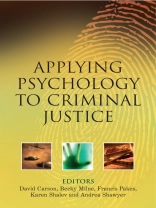Few things should go together better than psychology and law – and few things are getting together less successfully. Edited by four psychologists and a lawyer, and drawing on contributions from Europe, the USA and Australia, Applying Psychology to Criminal Justice argues that psychology should be applied more widely within the criminal justice system. Contributors develop the case for successfully applying psychology to justice by providing a rich range of applicable examples for development now and in the future. Readers are encouraged to challenge the limited ambition and imagination of psychology and law by examining how insights in areas such as offender cognition and decision-making under pressure might inform future investigation and analysis.
表中的内容
About the editors.
Contributors.
Preface.
Chapter 1 Psychology and law: A science to be applied (David Carson, Becky Milne, Francis Pakes, Karen Shalev and Andrea Shawyer).
Chapter 2 Eyewitness Identification (Ronald P. Fisher & Margaret C. Reardon).
Chapter 3 Behavioural science and the law: Investigation (John G. D. Grieve).
Chapter 4 Investigative interviewing: the role of research (Becky Milne, Gary Shaw and Ray Bull).
Chapter 5 Credibility assessments in a legal context (Aldert Vrij).
Chapter 6 Fact finding and evidence (Jenny Mc Ewan).
Chapter 7 A psychology and law of fact finding? (David Carson).
Chapter 8 Criminal responsibility (Susan Dennison).
Chapter 9 Criminal thinking (Emma Palmer).
Chapter 10 The Mentally Disordered Offender: Disenablers for the Delivery of Justice (Jane Winstone and Francis Pakes).
Chapter 11 Decision making in criminal justice (Edie Greene and Leslie Ellis).
Chapter 12 A behavioral science perspective on identifying and managing hindsight bias and unstructured judgment: Implications for legal decision making (Kirk Heilbrun and Jacey Erickson).
Chapter 13 To decide or not to decide: Decision making and decision avoidance in critical incidents (Marie Eyre and Laurence Alison).
Chapter 14 Processes: Proving guilt, disproving innocence (David Carson).
Chapter 15 The changing nature of adversarial, inquisitorial and Islamic trials (Francis Pakes).
Chapter 16 Misapplication of Psychology in Court (Peter J. van Koppen).
Chapter 17 Identifying liability for organizational errors (David Carson).
Chapter 18 Applying Key Civil Law concepts (David Carson, Becky Milne, Francis Pakes, Karen Shalev and Andrea Shawyer).
Index.
关于作者
All of the editors are based at the Institute of Criminal Justice Studies at Portsmouth University, which is the UK’s largest provider of criminal justice courses. David Carson is Reader in Law and Behavioural Sciences and is qualified as a lawyer. Becky Milne and Francis Pakes are both senior lecturers at the Institute. Karen Shalev is a lecturer, and Andrea Shawyer is a university tutor.












